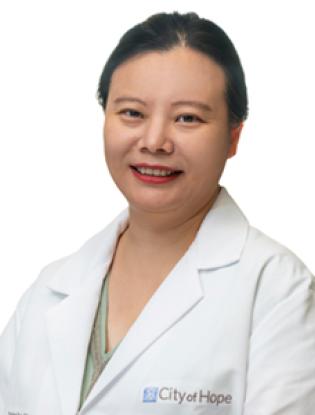Yingfeng Deng, Ph.D.

Yingfeng Deng, Ph.D., joined the Department of Diabetes & Cancer Metabolism at City of Hope in July 2021. Dr. Deng earned a Ph.D. from the Department of Cell Biology at Albert Einstein College of Medicine. Her thesis work focused on translational control of message RNA, conducted in the lab of Robert H. Singer, Ph.D. Dr. Deng then completed her postdoctoral fellowship with Philipp Scherer, Ph.D., at the Touchstone Diabetes Center at the University of Texas Southwestern Medical Center in Dallas. Her work revealed a few novel genes regulated by ER stress and their relevance to metabolic diseases. Dr. Deng then started her faculty position as research assistant professor at the Touchstone Diabetes Center in 2015. During this time, she identified a novel role of adipose tissue in energy homeostasis through the regulation of uridine, a nucleoside in circulation. She and Dr. Scherer also revealed a new paradigm of uridine metabolism, highlighting an unforeseen role of uridine as a metabolite signal in the pathophysiology of diabetes and cancer.
Duarte Cancer Center
Duarte, CA 91010
2002-2008, Ph.D., Cell Biology, Albert Einstein College of Medicine, Bronx, NY
1999-2002, M.S., Molecular Genetics, Fudan University, Shanghai, China
1995-1999, B.S., Biochemistry, Wuhan University, Wuhan, China
2008-2014, Touchstone Diabetes Center, University of Texas Southwestern Medical Center, Dallas, TX
2021, Assistant Professor, Department of Diabetes & Cancer Metabolism, Arthur Riggs Diabetes & Metabolism Research Institute, City of Hope, Duarte, CA
2015, Research Assistant Professor, Touchstone Diabetes Center, University of Texas Southwestern Medical Center, Dallas, TX
The Deng laboratory studies the homeostasis of uridine and its role in metabolism, which provides a new angle for understanding the pathophysiology of obesity, diabetes and cancer. Work in the lab utilizes both genetically engineered mouse models and in vitro systems. The lab currently uses a combination of state-of-the-art surgical, genetic, cellular, biochemical, imaging and metabolic flux approaches. Following up with the new paradigm revealed about uridine metabolism by Drs. Deng and Scherer (Science, 2017), the Deng lab is currently focusing on three areas: 1) the role of uridine in the progression of obesity and diabetes. 2) the physiology of uridine in bile and nutrient absorption. 3) the regulation of uridine homeostasis by ER stress and its relevance to breast cancer.
2019-2022, American Diabetes Association Junior Faculty Development Award
2013, Keystone Symposia Scholarship
2008-2012, American Diabetes Association Mentor-Based Postdoctoral Fellowship Award
- Deng Y, Wang ZV, Ruth G, Zhu Y, Ali A, Zhang C, Wang X, Shao M, Zhang Z, Lyengar P, Gupta RK, Horton JD, Hill JA, Scherer PE. Adipocyte Xbp1s Overexpression Drives Uridine Production and Reduces Obesity. Molecular Metabolism, 2018 May. 11:1.
- Deng Y, Wang ZV, Gordillo R, An Y, Zhang C, Liang Q, Yoshino J, Cautivo KM, De Brabander J, Elmquist JK, Horton JD, Hill JA, Klein S, Scherer PE. An adipo-biliary-uridine axis that regulates energy homeostasis. Science 2017; 355 (6330).
- Wang ZV, Deng Y, Gao N, Pedrozo Z, Li DL, Morales CR, Criollo A, Luo X, Tan W, Jiang N, Lehrman MA, Rothermel BA, Lee AH, Lavandero S, Mammen P, Ferdous A, Gillette TG, Scherer PE, Hill JA. Spliced X-box binding protein 1 couples the unfolded protein response to hexosamine biosynthetic pathway. Cell. 2014, 156(6):1179.
- Deng Y, Wang ZV, Tao C, Gao N, Holland WL, Ferdous A, Repa JJ, Liang G, Ye J, Lehrman M, Hill JA, Horton JD, Scherer PE. The Xbp1s-GalE axis links ER stress to postprandial hepatic metabolism. J. Clin. Invest. 2013, 123(1):455.